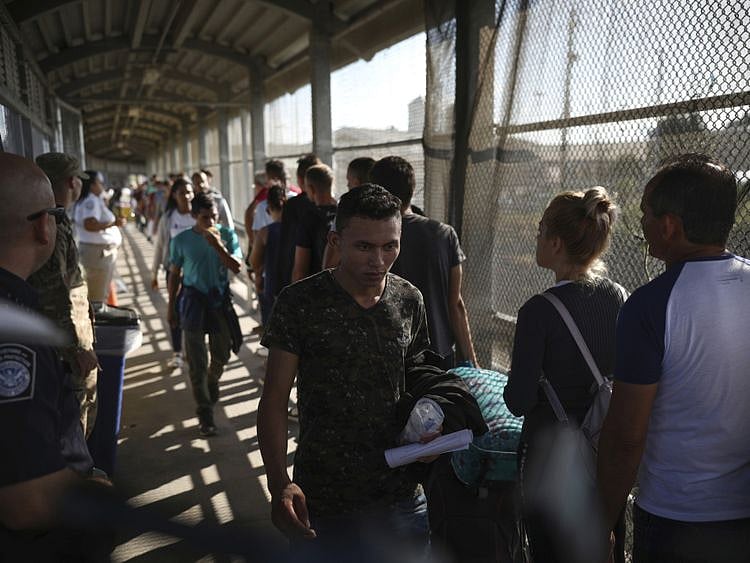Why migrant parents put their children at risk
There is a need to express solidarity with families that share the desire of care

The idea that only “bad parents” would take their little ones on the perilous journey isn’t just an ugly whisper among the faceless and nameless on Twitter — it’s implied at the highest levels of government in the United States.
After hundreds of undocumented workers were arrested in raids on Mississippi food-processing plants, the acting director of Immigration and Customs Enforcement, Matthew Albence, compared the arrested workers to domestic abusers, who also leave behind crying children when they are detained. Then US Homeland Security secretary Kirstjen Nielsen bluntly told the press last year that there was no difference between separating families in immigration raids and separating them through arrests for other crimes.
“We do it every day in every part of the country,” she said. “If you have a family and you commit a crime, the police do not put you in jail because you have a family.”
The message for everyone is clear: Bad parents are responsible for family separations through their own illegal behaviour. Yet, we know that a courageous parental love often fuels a person’s decision to cross the border, to send their child north or to stay in the US illegally.
Opening borders
That love doesn’t and shouldn’t negate the law or the American government’s prerogative to protect victims of human trafficking — which can result in separation. It doesn’t mean America should open its borders or provide free health care for everyone who walks into Texas. Sometimes family separation may be appropriate and it’s important to maintain secure borders with an eye on fair, humane reforms that honour our allegiance to providing asylum.
But patriotism and politics aside, is it too much to ask that we offer compassionate consideration towards parents who must choose between unsafe and less-safe conditions for their children? Their harrowing choice to uproot home and life demands respect and empathy, not mockery and contempt, from those with the great fortune of not having to make that decision.
Given the coverage of conditions on the journey to the US, it may take some imagination to understand why anyone would take their child on such a trip, much less send them off on their own. But the decision to trek from Central America or elsewhere to reach the US is a rational one — likely the best one for child welfare — when faced with murder, corruption and hopelessness at home. Whether escaping gangs in El Salvador, sexual violence in Honduras or extreme poverty in Mexico, many families have risked everything to cross the border for the sake of their children’s future. These aren’t bad parents — they are the best of parents.
Selfless act
As Jason Braun, co-founder of Restoration Immigration Legal Aid, puts it: “I think it’s the most selfless act of love to do it.” Krish O’Mara Vignarajah, president and chief executive of Lutheran Immigration and Refugee Service, has worked with 40 children separated from their families in the past few months alone, four of them under the age of one, and describes their families as overwhelmingly “incredibly close, strong, tight-knit”.
Love and closeness aren’t always a matter of proximity. And family isn’t defined merely as a child’s biological parents: Even those crossing the border as unaccompanied minors often have a family member or parent waiting for them in the US or have travelled with unofficial guardians trusted by their parents.
Yet, the scripted blame emanating from government officials and partisan activists takes none of these conditions or nuances into account, preferring a focus on strict immigration enforcement over humane recognition of those in horrific situations.
Glimpse of a shining city
Migrant parents didn’t create the system or choose where they were born. They just caught a glimpse of a shining city on a hill close enough to climb. That they gathered their valuables and loaded their children into strollers or onto their backs and headed towards that hill is a mark of love and courage, not selfishness or carelessness.
Having compassion for both parent and child isn’t antithetical to respecting the law or valuing secure borders. Concern about human trafficking and a desire to ensure safety for minor children are thoroughly valid, and safeguards are necessary, even if flawed. At the same time, rejecting the myth of “bad parenting” is one way people can restore dignity to our fellow men and women. We ought to link arms in solidarity with those who share the universal desire of all parents: For our children to have a better life than we did. The parenting, for these brave families, is the whole point.
— Washington Post
Ericka Andersen is a freelance columnist and writer based in Indianapolis in the US state of Indiana.
Sign up for the Daily Briefing
Get the latest news and updates straight to your inbox
Network Links
GN StoreDownload our app
© Al Nisr Publishing LLC 2026. All rights reserved.